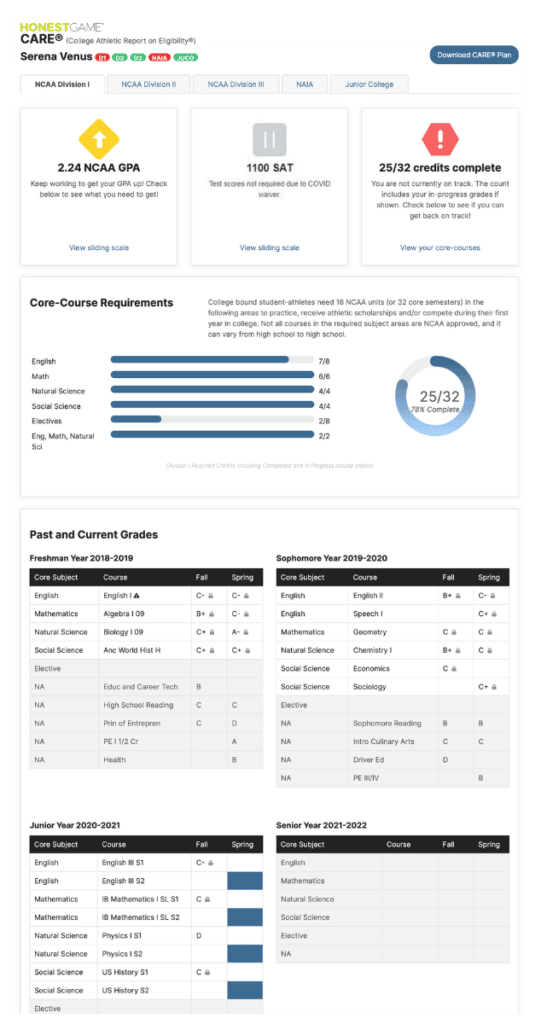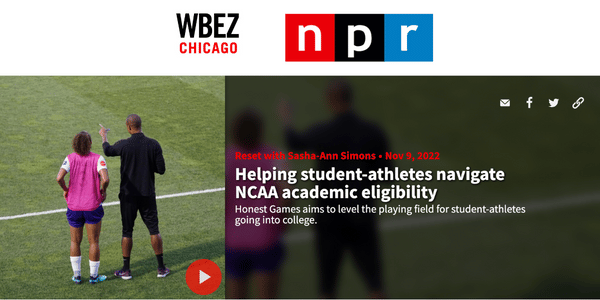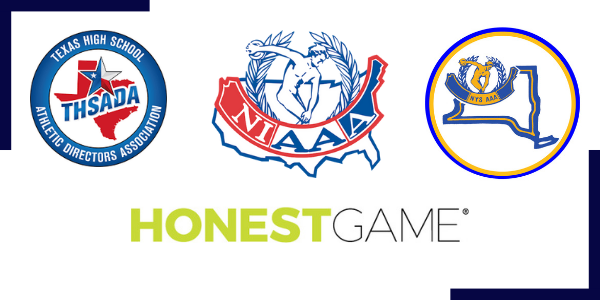School Counselors Resources to Support College-Bound Student-Athletes
Updated on Aug 8, 2023

Counselors navigate a wide range of needs to set their students up for post-secondary success. As caseloads continue to increase, it’s even more challenging to keep track of the complex requirements for students who hope to play college sports.
We know getting students on the right post-secondary pathway is a team effort! Counselors, athletic directors, coaches, and families all play important support roles. Honest Game has identified the key takeaways for school counselors to support their college-bound student-athletes’ road to success.
Identifying Strengths of a Student-Athlete
Research shows that athletes are stronger and more resilient at their sport when they construct an identity that goes beyond athletics. How can we help build their identity to build their strength as a student? Often, school counselors should focus on the “who before what” to help student-athletes shape their identity around who they are, before deciding what they’ll do.
Recognize Short-Term and Long-Term Goals
Does the student-athlete have the desire to participate in college athletics? Encouraging academic goals and relating those goals to their sport tends to increase performance in both areas. Many student-athletes are exploring the idea of college athletics however, they might not be sure exactly what level or if they can compete in college. Some may have a definite plan in place with the exact path and school, which can provide an excellent outline for their academic goals. These conversations can happen early and often.
Honest Game stresses the importance of being prepared with an appropriate course schedule and load to be ready for NCAA academic eligibility requirements.
The NCAA requires incoming college freshman student-athletes entering NCAA Division I (DI) and Division II (DII) to complete 16 units (32 semesters) of NCAA-approved core courses. These courses must be completed on a specific timeline and in specific subject areas. Taking at least 4 units (8 semesters) of NCAA-approved core courses every year, starting the first year of high school, is key to staying on track.
Here is where Honest Game can help. Honest Game’s CARE® provides each student-athlete with an individualized academic eligibility plan with clear short-term goals to achieve the eligibility requirements needed for college sports.

Preparation for Best College Fit as a Student-Athlete
Your expertise as a counselor in college selection is extremely helpful to your student-athletes. Asking the student-athlete the specific questions will help narrow down their search as they look to play at the college level:
- Have you started reaching out to college coaches to find out if they are interested? If not, get started. What are you doing to get yourself out there? Attending camps, completing questionnaires, emailing coaches, sending highlight reels, reaching out via Twitter?
- What are your academic interests? Often, kids don’t know what schools they like, but asking what they enjoy will help them narrow down the list of schools.
- How do you envision your ideal college experience? What size student body, diversity, campus, and proximity to home are you looking for?
- How do you envision your college athletic experience? Starting as a freshman, happy to be a walk-on, need help with admissions, being the star, playing all four years, traveling or just being on the practice squad, scholarship, or no scholarship?
- If I was unable to play my sport at these schools, would I still be interested in attending?
Honoring Student-Athlete’s Commitment to Sport
Understanding the commitment to athletics and sharing that awareness with student-athletes is instrumental in their achievements and struggles. As their counselor, your role is very important to build their confidence.
As a school counselor, you may find student-athletes have highs and lows while in season vs. out of season, continuing to communicate with them about their commitment to athletics will foster essential conversations about future plans.
Post-secondary opportunities in athletics are demanding, but also extremely rewarding. Student-athletes thrive on their support system to continue to build their confidence, so they can thrive in their sport and the classroom. By creating a community around our student-athletes and by finding something positive to say about each experience (good or bad), school counselors can create an environment where student-athletes feel supported, and confident and can achieve beyond their potential.
Managing and Determining Expectations
With the help of a school counselor, student-athletes need to identify why they would like to compete at the next level. How much commitment are they willing to put forth in their college life to athletics? How will playing sports at the college level impact their academic goals?
Current high school student-athletes can gain a fresh perspective with a realistic insight into the life of college athletes by talking with someone that has previously been in their shoes.
School counselors can encourage conversations with former student-athletes that may offer a real-world perspective on collegiate sports.
Discussing the time management skills required for competing at all playing levels is important, as is sharing the available options outside of NCAA DI and DII. Learn more about why more than 195,000 student-athletes choose to compete at the DIII level in the blog, “Is NCAA DIII for Me?”.
Things School Counselors Should Watch Out for When Working with Student-Athletes
-
- Early Graduation (popular with football players)
- Will students be eligible if they graduate early?
- Reclassification (popular with basketball players)
- Will students be off track if they reclass? If they reclass, are they duplicating the same year again?
- Looking at junior college options and understanding the alternative pathway
- Academic Eligibility Issues
- Missing NCAA-approved English (common subject-specific issue)
- Missing NCAA-approved Math (common subject-specific issue)
- NCAA 10/7 Rule before the start of senior year
- NCAA Core GPA vs. School GPA
- If students don’t take a foreign language, do they have enough “additional courses”
- During course selection double check to confirm core courses are NCAA approved
- Transfer Students
- Check their old school’s NCAA-approved list of courses
- International Students
- Check the country’s course approvals, etc.
- ELL/ESL
- Does your school have the appropriate approvals? If not, are those students supplementing their English requirements?
- Summer School
- Ensure summer school courses count for both graduation and NCAA eligibility
- Virtual Courses
- Ensure virtual courses count for both graduation and NCAA eligibility
- Early Graduation (popular with football players)
Quick Resources for Counselors to Share with Student-athletes and Families
- Honest Game Academic Eligibility 101 for Schools
- Honest Game Checklist for College-Bound Student-Athletes
- NCAA Recruiting Calendars – NCAA member schools limit recruiting to certain periods during the year. Recruiting calendars to promote the well-being of college-bound student-athletes and ensure fairness among schools by defining certain periods during the year in which recruiting may or may not occur in a particular sport. Due to the COVID-19 pandemic and with recent changes in NCAA legislation, recruiting calendars may be adjusted.
- NCAA School Interactive Map
- NAIA School Map
- NJCAA/JUCO School Map
How Does Honest Game Help School Counselors and Student-Athletes?
Honest Game relieves counselors from doing projections by hand, which is very time-consuming and complex. Plus, the NCAA regulations seem to be continuously updated, and just keeping up with the changes could be a full-time job.
Beth Arey, a former college athlete, and current College & Career Coordinator at Evanston Township High School knows firsthand how keeping up with the evolving academic eligibility requirements can be.
“When we think about what courses and what grades a student may need to have to be eligible, there is a lot of room for error”, says Arey. “I can go into Honest Game and know exactly what a student needs to do. Being able to share that with families is really important.”
Honest Game also helps high schools stay compliant with the NCAA. “Honest Game provides a huge value with the core course list that the NCAA requires us to maintain. It’s a lot of work for staff to know that this list exists, what is on it, and how to keep it accurate” added Arey.
“Honest Game is that conduit between the school administration and curriculum instruction components and the NCAA eligibility portal. It’s an asset to the school system. Having this resource becomes paramount to continuing the success of our student-athletes.”
As the industry-leading academic compliance solution, Honest Game’s technology helps educators ensure their schools and student-athletes are tracking with NCAA & NAIA requirements for college athletics.
Contact us today to learn how Honest Game technology supports school counselors and administration to help guide your student-athletes on the pathway to post-secondary athletics.

A former High School Athletic Director with more than 14 years of experience, Courtney has guided thousands of student-athletes through the NCAA and NAIA college eligibility and athletic recruiting process.



